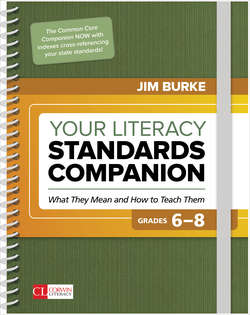Читать книгу Your Literacy Standards Companion, Grades 6-8 - Jim Burke - Страница 8
На сайте Литреса книга снята с продажи.
Moving Forward—Together
ОглавлениеAn excellent education should not be an accident; it should be a right, though nowhere in the U.S. Constitution or any of our other founding documents do we find that right listed. Across the nation, state academic standards address that omission and challenge us all—administrators and teachers, parents and children, politicians and the public at large, professors and student teachers—to commit ourselves anew to the success of our children and our country.
In my nearly 25 years in education, I have been involved with many efforts to develop standards. I have had the honor of sitting alongside some of our country’s greatest educational innovators and leaders to help develop the College Board’s Pre-AP English Language Arts Framework, the National Board for Professional Teaching Standards for Adolescent Literacy, the National Council of Teachers of English Language Arts Standards, the framework for the Advanced Placement English Literature and Composition, the California Standards for English Language Arts, and, to the extent that such books serve as a form of literacy standards, the Holt McDougal 6–12 language arts textbooks. But the standards movement today is different: it comes with a level of support, a degree of commitment from leaders at all levels of government and business, and a sense of urgency that the other efforts could not or cannot claim.
There is a sense that we are all at some crucial inflection point in our national story, one that provides an opportunity we must not squander if our children are to help make this story we are trying to write about our country come true. I am often struck, listening to my mother-in-law, who has lived with us for many years, by her description of the country during the Depression and World War II, both of which she endured while living in the house she now shares with us. Almost any story she tells conveys a sense of shared commitment to the good of the community and country, that vital sense of mission that everyone was in it together, even—or especially—when the work was difficult and demanded some sacrifice.
It is not just the country and students that stand to benefit from the new commitment to standards, but teachers, too, for as Calkins, Ehrenworth, and Lehman (2012) argue, teaching to standards can “deepen the reading skills of adults as well.” It is this same sense of mutual benefit that Carol Jago (2005) calls to mind in her allusion to the old U.S. Navy watchword of “one hand for the ship, one hand for yourself” (p. 101), because everything I have done to better understand and implement the standards has only made me more aware of my teaching, and improved it, by making it more “intentional [and challenging me to] establish an environment conducive for learning by setting objectives, reinforcing effort, and providing recognition” (Kendall, 2011, p. 28).
Arthur Applebee (2013), in writing more specifically about the Common Core State Standards, offered a detailed analysis that illustrates and confirms “that aligning our teaching [to standards] does not mean we need to abandon all that we have learned about effective curriculum and instruction.” Applebee spends much of this journal article analyzing lessons from my own class, which I described in What’s the Big Idea? Question-Driven Units to Motivate Reading, Writing, and Thinking (Burke, 2010). In his analysis, Applebee notes the following:
Burke’s lessons are quite overtly aligned to standards. Rather than teaching to the tests, these lessons focus on engaging students in cognitively and linguistically challenging tasks in the course of which they will gain the knowledge and skills that the standards require.
Units with the richness and imagination of those that Burke describes in What’s the Big Idea? reflect a coming together of the wisdom of practice with the best of current research and theory on the teaching of English language arts. Such teaching does not offer the simple prescriptions that guide classrooms that focus curriculum and instruction more directly on the standards and the tests that accompany them. But the paradox is that by not teaching to the test, students in classrooms like Burke’s will do better on tests in general, and at the same time develop the knowledge and skills to do well in other contexts of schooling, life and work. And schools will be much more interesting places to be, for teachers and students alike. (p. 33)
